 Last additions - Kita-Ibaraki 北茨城市 Last additions - Kita-Ibaraki 北茨城市 |
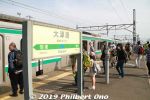
JR Otsuko Station platform.Jun 03, 2019
|
|

JR Otsuko Station platform.Jun 03, 2019
|
|
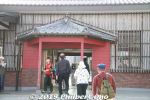
JR Otsuko Station has its entrance modeled after the Rokkakudo Pavilion on the Izura Coast.Jun 03, 2019
|
|
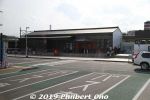
JR Otsuko StationJun 03, 2019
|
|
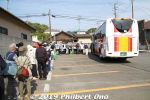
Shuttle bus back to JR Otsuko Station. Shuttle bus stop was near the start point a few hundred meters from the corner.Jun 03, 2019
|
|
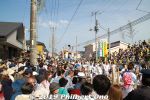
This corner is the most crowded spot. Many people leave after seeing this corner turn.Jun 03, 2019
|
|
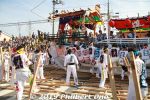
Jun 03, 2019
|
|
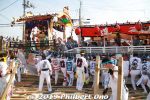
Getting ready for the rest of the straight route.Jun 03, 2019
|
|

They turned the boat 90 degrees in one drag.Jun 03, 2019
|
|
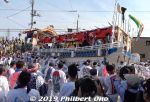
Turning the boat 90 degrees.Jun 03, 2019
|
|
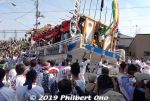
They turn the boat by dragging the stern of the boat. They had a rope tied to the rear part of the boat.Jun 03, 2019
|
|

The route has one 90-degree corner where the boat is turned. This is a festival highlight and many people crowd this corner.Jun 03, 2019
|
|
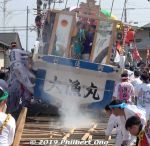
The friction between the boat hull and pallets makes it smoke each time the boat is dragged. The pallets are scorched.Jun 03, 2019
|
|
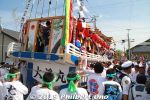
Jun 03, 2019
|
|
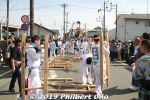
Jun 03, 2019
|
|
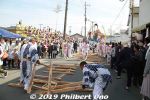
Picking up the pallets.Jun 03, 2019
|
|
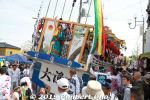
The boat is tilted to one side when it is dragged. It creates less friction and makes it easier to drag.Jun 03, 2019
|
|
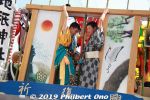
Three shrine priests are among the 40 people onboard. It's pretty rough to be rocked often. Motion sickness is possible.Jun 03, 2019
|
|
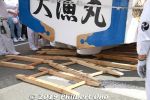
The boat hull has small center ridges that keep it standing upright. It's also designed not to topple over when rocked.Jun 03, 2019
|
|
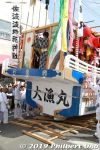
Jun 03, 2019
|
|
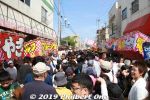
Narrow streets make it crowded.Jun 03, 2019
|
|
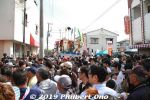
Jun 03, 2019
|
|
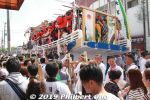
Jun 03, 2019
|
|
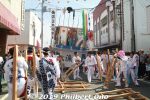
After the drag, they pick up the pallets and lay them in front of the boat on the road ahead.Jun 03, 2019
|
|
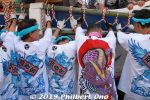
Jun 03, 2019
|
|
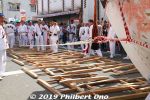
Pallets are ready for the next drag.Jun 03, 2019
|
|
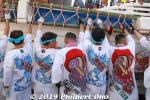
There are men on both sides of the boat who rock the boat before the drag. When the boat moves, they hang on to the boat.Jun 03, 2019
|
|

Ofune being dragged over wooden pallets.Jun 03, 2019
|
|

Dragging the boat over the wooden pallets.Jun 03, 2019
|
|

They drag the boat 20 meters at a time. After each drag, they have to move and place the pallets ahead of the boat. The route is 1,200 meters long, and it takes 5 hours to reach the end.Jun 03, 2019
|
|
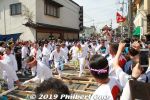
When dragging the boat, the men have to run over the wooden pallets and take care not to trip and fall.Jun 03, 2019
|
|
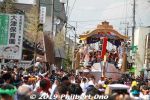
Jun 03, 2019
|
|
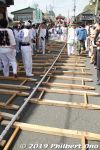
Boat is pulled by a 200-meter white rope, 7 cm thick. About 200 to 300 people pull the boat.Jun 03, 2019
|
|
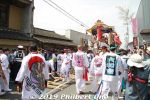
Before dragging the boat, they violently rock the boat side to side.Jun 03, 2019
|
|
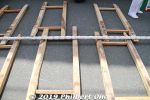
They use about 100 soroban wooden pallets (ソロバン) made of Japanese oak tree, a hard wood. Each weighs 20 kg.Jun 03, 2019
|
|
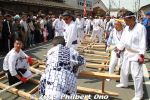
Ahead of the boat, wooden pallets called "soroban" are laid on the road for the boat to be dragged on.Jun 03, 2019
|
|
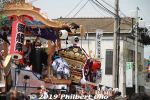
The portable shrine is loaded on the boat.Jun 03, 2019
|
|
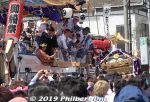
The boat crew welcome the portable shrine before it is loaded aboard.Jun 03, 2019
|
|
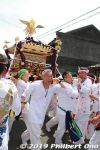
After being paraded around town all morning, the portable shrine arrives near the boat.Jun 03, 2019
|
|
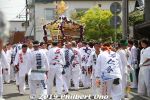
After being paraded around town all morning, the portable shrine arrives near the boat.Jun 03, 2019
|
|
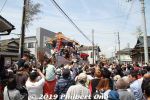
Jun 03, 2019
|
|
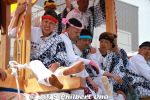
Boat crew waiting for the portable shrine to be loaded on the boat, which then becomes a "sacred boat."Jun 03, 2019
|
|
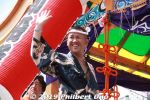
Looks like the boat captain.Jun 03, 2019
|
|
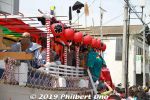
Boat musicians and crew board the boat via ladder.Jun 03, 2019
|
|
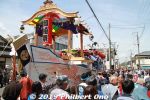
Jun 03, 2019
|
|
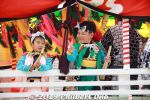
Most boat musicians are local kids.Jun 03, 2019
|
|
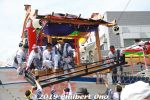
Removing in the boat railingsbefore people boarded.Jun 03, 2019
|
|
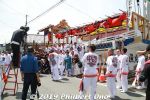
Group photos in front of the boat.Jun 03, 2019
|
|
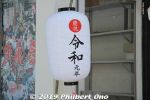
This was the first Ofune Matsuri to be held in the new era of Reiwa.Jun 03, 2019
|
|
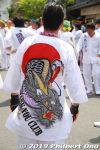
Thank You ClubJun 03, 2019
|
|
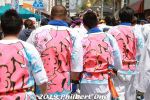
The festival participants belong to different fishermen's groups indicated by their shirt. They are from a group called Fudo-maru.Jun 03, 2019
|
|
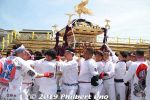
On May 3 from morning, they parade the mikoshi portable shrine bearing Sawawachigi Shrine's god for maritime safety.Jun 03, 2019
|
|
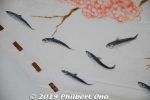
SardinesJun 03, 2019
|
|
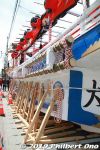
The festival originally used an actual fishing boat. But now this wooden boat was built especially for the festival.Jun 03, 2019
|
|
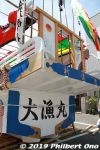
Jun 03, 2019
|
|
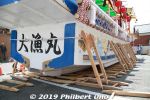
The boat rests on wooden pallets called "soroban." It is dragged on a bed of soroban pallets.Jun 03, 2019
|
|
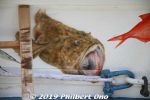
Paitning of a monkfish, a delicacy of Kita-Ibaraki.Jun 03, 2019
|
|
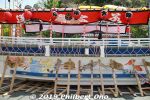
The festival used to be held by local fishermen, Now held by Hitachi-Otsu Ofune Matsuri Preservation Society (常陸大津の御船祭保存会) with most of the men being fishermen or their descendants.Jun 03, 2019
|
|
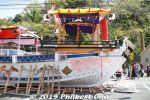
The festival started to be held every 5 years from 1975. The boat has to be repaired after each festival and the money could not be secured more often than every 5 years.The boat is normally displayed at a fishing museum named Yo-soro (よう・そろー) in Kita-Ibaraki.Jun 03, 2019
|
|
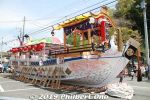
This festival was originally a portable shrine procession on the sea via boat going around the bay. But the boat's start point was filled in, so the boat procession was then held on land instead since 200 years ago.Jun 03, 2019
|
|
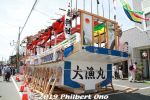
Back of ofune boat.Jun 03, 2019
|
|

My video of Kita-Ibaraki's Ofune Matsuri boat festival.Jun 03, 2019
|
|
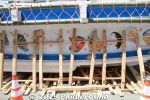
The ofune wooden fishing boat is painted with local fish.Jun 03, 2019
|
|
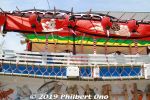
Boat is 15 meters long, 4 meters wide, and weighs 5 tons. It becomes 2 tons heavier when the portable shrine (1 ton) and crew and musicians board.Jun 03, 2019
|
|
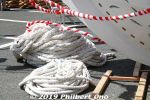
White ropes to pull the boat on the road.Jun 03, 2019
|
|
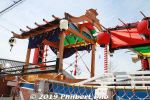
The bow has this shed for the portable shrine to be loaded on. Festival was designated as a National Important Intangible Folk Cultural Property (重要無形民俗文化財) in 2017.Jun 03, 2019
|
|
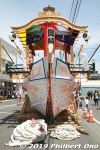
On the May 3 main festival day, the boat is dragged along the same route west to east with the portable shrine and shrine priests aboard.This boat is here at the start point on May 3, 2019.Jun 03, 2019
|
|
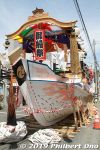
On the May 2 festival eve, the boat is pulled from east to west along 1,200 meters in the center of town without the portable shrine aboard.Jun 03, 2019
|
|
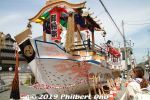
Unique Shinto festival where they drag a sacred fishing boat across land instead of water. The boat has no wheels. All other boat festivals have the boat sailing on water, but not this one.Jun 03, 2019
|
|
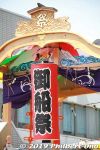
Hitachi-Otsu Ofune Matsuri fishing boat festival is Kita-Ibaraki's biggest festival, held only only once every five years on May 2 and 3 as the grand spring festival of Sawawachigi Shrine (佐波波地祇神社) in Otsu-cho, Kita-Ibaraki, Ibaraki PreHeld by local fishermen to pray for abundant fish and maritime safety. These photos were taken on May 3, 2019.Jun 03, 2019
|
|

Short video of Hitachi-Otsu Ofune Matsuri boat festival.May 11, 2019
|
|
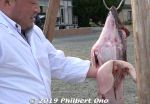
The chef is holding the liver (ankimo), the most prized part of the fish.Mar 23, 2019
|
|
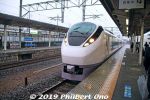
At JR Isohara Station, our tokkyu express train back to Ueno, Tokyo.Mar 22, 2019
|
|
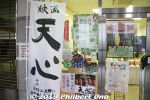
Tourist information center at JR Isohara Station.Mar 22, 2019
|
|
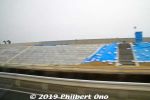
A sea wall being built. After 8 years, we hardly saw any other remnants of tsunami or quake damage.Mar 22, 2019
|
|
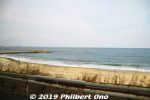
Kita-Ibaraki also has flat, sandy beaches.Mar 22, 2019
|
|

Appetizers. The food is good though.Mar 22, 2019
|
|
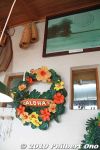
Marsala restaurant has Hawaiian decor, but no Hawaiian food. Only tropical drnks in summer.Mar 22, 2019
|
|
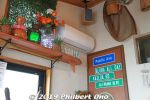
Marsala restaurant has Hawaiian decor.Mar 22, 2019
|
|
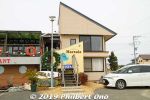
Marsala restaurant near the Izura Coast. マルサーラMar 22, 2019
|
|
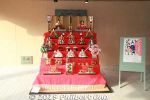
Hina Matsuri dolls displayed at the museum entrance.Mar 22, 2019
|
|
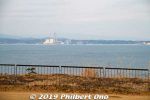
The museum has fine views of the ocean and southern coast of Fukushima (Iwaki). You may also notice a power plant in the distance. That's not the one that had a meltdown in 2011. It's the Nakoso Power Plant (勿来発電所), a thermal power plant (non-nuclear) operated by Joban Joint Power Co., Ltd.Mar 22, 2019
|
|
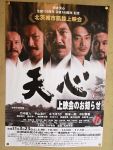
Movie poster for the movie, "Tenshin." It was being screened in the city.Mar 22, 2019
|
|
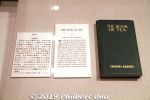
Tenshin was proficient in English and wrote the classic book, "The Book of Tea" in English.Mar 22, 2019
|
|
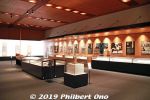
Tenshin Memorial Room explained the life and achievements of Tenshin. Founded Nihon Bijutsu-in (Art Institute of Japan) and moved it from Tokyo to Izura coast in Kita-Ibaraki in 1906.Includes exhibits about the time he worked at the Boston Museum of Fine Arts in 1910 in charge of the Chinese/Japanese art division.Mar 22, 2019
|
|
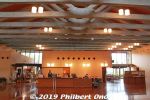
Lobby of Tenshin Memorial Museum of Art.Tenshin is revered in Kita-Ibaraki because he moved his Nihon Bijutsu-in artist group (Art Institute of Japan) here from Tokyo in 1906. His students, prominent Nihonga painters Yokoyama Taikan (1868–1958), Hishida Shunso (1874–1911), Shimomura Kanzan (1873–1930), and Kimura Buzan (1876–1942) followed him to this picturesque Izura Coast and built artist studio residences near Tenshin's home. The residences of Tenshin, Taikan, and Buzan still remain.Mar 22, 2019
|
|
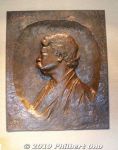
Tenshin Memorial Museum of Art was named after Okakura Tenshin (aka Okakura Kakuzo 1863–1913 岡倉天心/覚三), a famous art scholar and advocate of Japanese art, especially Nihonga paintings.In 1890, he was one of the founders and the first de facto dean of the forerunner of the Tokyo University of the Arts (Geidai), one of Japan's most prominent art universities.Mar 22, 2019
|
|
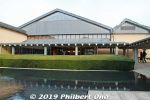
Tenshin Memorial Museum of Art, Ibaraki (茨城県天心記念 五浦美術館). Beautiful art museum in a beautiful place on the coast.Mar 22, 2019
|
|
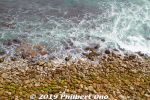
Mar 22, 2019
|
|
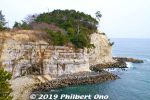
Izura CoastMar 22, 2019
|
|
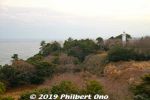
Mar 22, 2019
|
|
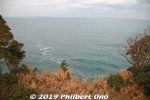
View from the lookout tower.Mar 22, 2019
|
|
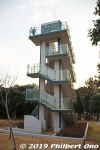
Izura Misaki Park has this lookout tower. 五浦岬公園 展望慰霊塔Mar 22, 2019
|
|
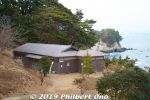
Prop for the movie "Tenshin."Mar 22, 2019
|
|
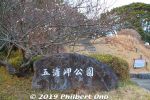
Izura Misaki Park on the coast.Mar 22, 2019
|
|
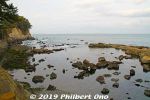
Mar 22, 2019
|
|
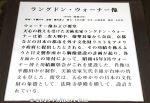
About Langdon Warner.Mar 22, 2019
|
|
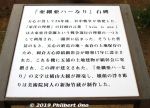
About the "Asia is One" monument.Mar 22, 2019
|
|
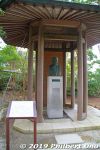
Along the path to Rokkakudo is this bust of Harvard professor and art historian Langdon Warner (1881–1955) who once studied under Tenshin and visited here. He is being revered here for supposedly helping to save Kyoto and Nara from World War II bombingsMar 22, 2019
|
|
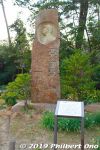
Mar 22, 2019
|
|

About the Tenshin residence.Mar 22, 2019
|
|
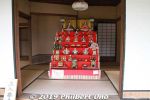
Hina dolls displayed inside Tenshin's home for Girl's Day (March 3).Mar 22, 2019
|
|
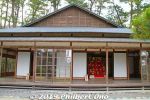
Tenshin's home on the Izura Coast, near the Rokkakudo Pavilion. Can't go inside.Mar 22, 2019
|
|
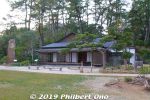
Tenshin's home on the Izura Coast, near the Rokkakudo Pavilion. Mar 22, 2019
|
|
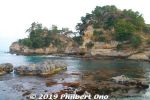
Artist-inspiring scenery around Rokkakudo, Kita-Ibaraki.Mar 22, 2019
|
|
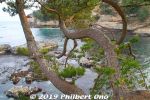
Mar 22, 2019
|
|
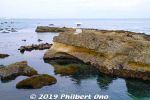
Scenery in front of Rokkakudo.Mar 22, 2019
|
|
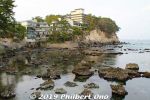
Scenery around Rokkakudo.Mar 22, 2019
|
|

About Rokkakudo.Mar 22, 2019
|
|
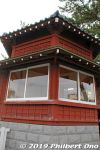
Mar 22, 2019
|
|
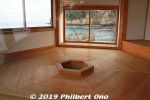
You cannot enter the Rokkakudo, but you can see inside through the glass windows made in the UK. There's supposed to be tatami mats inside. Mar 22, 2019
|
|
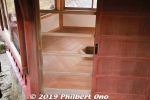
Must've been mesmerizing to pass time here. A place to attain artistic enlightenment. Mar 22, 2019
|
|
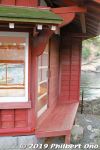
Mar 22, 2019
|
|
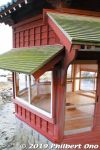
The glass windows were made in the UK.Mar 22, 2019
|
|
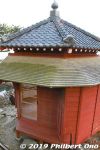
Mar 22, 2019
|
|
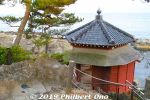
For a small admission fee, you can go down a path to see the Rokkakudo. (五浦六角堂).Mar 22, 2019
|
|
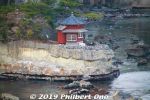
Izura Rokkakudo (五浦六角堂) is now being maintained by Ibaraki University and it continues to be a sacred spot for Japanese artists.Mar 22, 2019
|
|
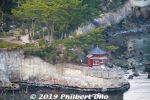
In Kita-Ibaraki, Tenshin used Rokkakudo to listen to ocean waves and gaze at the scenery. On March 11, 2011, it was washed away by the tsunami, but it was rebuilt in 2012. Mar 22, 2019
|
|
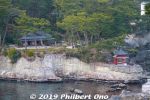
The small red pavilion is Izura Rokkakudo (五浦六角堂), the symbol of Kita-Ibaraki. Izura Rokkakudo was originally designed and built in 1905 by artist Okakura Tenshin (岡倉天心) as part of his residence. His house is on the left..Mar 22, 2019
|
|
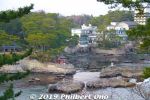
Kita-Ibaraki is a small, coastal city (pop. 42,000) with these picturesque cliffs of the Izura Coast (五浦海岸). Famous art scholar Okakura Tenshin (1863–1913 岡倉天心) found this scenic place to be a great inspiration for artists and moved hereMar 22, 2019
|
|
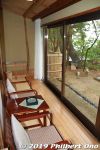
One of the most elegant Japanese-style hotels I've ever seen. Precious artwork everywhere. It's like staying in an art museum.Mar 22, 2019
|
|
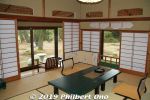
Large and private corner guest room inside Kimura Buzan home. It costs about ¥18,000 per person per night to stay here.Mar 22, 2019
|
|

Fancy corridor inside Kimura Buzan home.Mar 22, 2019
|
|
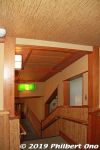
Fancy corridor inside Kimura Buzan home.Mar 22, 2019
|
|
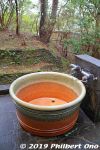
Outdoor bathtub made of Shigaraki-yaki pottery (from Shigaraki, Shiga Prefecture). The hotel has excellent taste in bathtubs. 信楽焼Mar 22, 2019
|
|
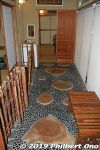
Corridor with pebbled floor leading to the outdoor bath.Mar 22, 2019
|
|
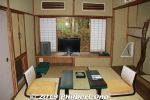
A smaller guest room.Mar 22, 2019
|
|
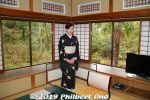
The okami-san posing in another guest room of the Buzan residence. Mar 22, 2019
|
|
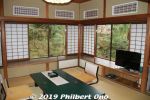
Corner room.Mar 22, 2019
|
|
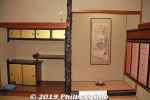
Tokonoma of another guest room. Many of the materials are quite rare and valuable today.Mar 22, 2019
|
|
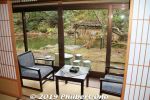
Relax here with a view.Mar 22, 2019
|
|
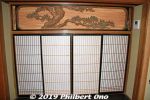
Elegant transom with a pine tree carving.Mar 22, 2019
|
|

A large guest room. 武山邸客室Mar 22, 2019
|
|
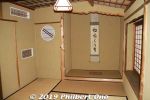
Buzan's beautiful tea ceremony room. Very chic. Available for rent for tea ceremonies.Mar 22, 2019
|
|
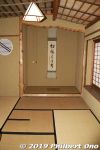
Buzan's beautiful tea ceremony room.Mar 22, 2019
|
|
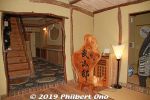
Entrance lobby of Kimura Buzan home. The wooden sign says "Buzan Residence." 武山邸Mar 22, 2019
|
|
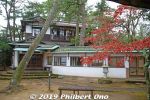
Part of the Buzan residence.Mar 22, 2019
|
|
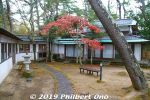
Different parts of the residence are connected by enclosed corridors.Mar 22, 2019
|
|
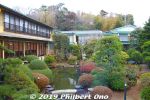
Courtyard garden of Buzan home.Mar 22, 2019
|
|
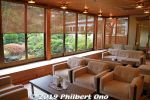
Itsuura Kanko Hotel Honkan lobby.Mar 22, 2019
|
|
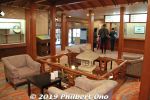
Itsuura Kanko Hotel Honkan lobby.Mar 22, 2019
|
|
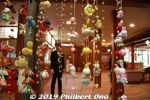
Lobby with Hina Matsuri decorations.Mar 22, 2019
|
|
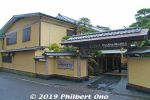
Another part of the Itsuura Kanko Hotel is the main wing (本館) which is the former artist residence of Kimura Buzan (木村武山), another famous Nihonga painter who followed Tenshin to Izura.Mar 22, 2019
|
|
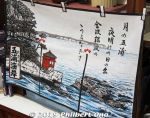
Hotel gift shop had this noren curtain with Rokkakudo design.Mar 22, 2019
|
|

Hotel gift shop.Mar 22, 2019
|
|
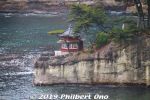
View of Rokkakudo from the hotel's modern tower.Mar 22, 2019
|
|
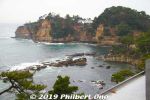
View from the hotel's modern tower.Mar 22, 2019
|
|
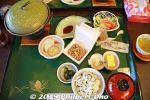
Breakfast included natto fermented soybeans. Ibaraki is famous for natto.Mar 22, 2019
|
|
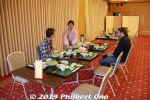
Next morning, breakfast in a large banquet hall.Mar 22, 2019
|
|
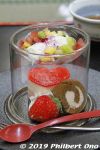
We were super stuffed, but there's always room for dessert...Mar 22, 2019
|
|
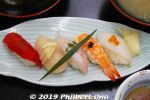
Sushi. Tuna, shrimp, ika squid, hotate scallop.Mar 22, 2019
|
|
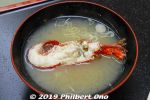
Lobster in miso soup.Mar 22, 2019
|
|
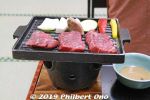
Hitachi Wagyu beef was just a small part of our dinner. We got really stuffed. 常陸牛Mar 22, 2019
|
|
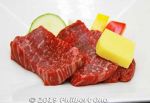
Local Hitachi Wagyu beef. ("Hitachi" is an old name for Ibaraki Prefecture. The famous electronics company Hitachi is also from Ibaraki.) 常陸牛Mar 22, 2019
|
|
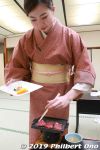
Hotel staff in kimono cooking my Hitachi Wagyu beef. 常陸牛Mar 22, 2019
|
|
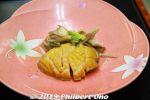
Abalone steak.Mar 22, 2019
|
|
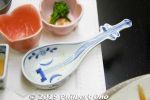
Biwa lute-shaped dish.Mar 22, 2019
|
|
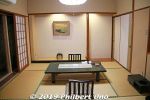
Typical room in the hotel's modern tower. This is the living room.Mar 22, 2019
|
|
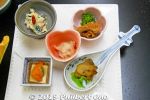
Appetizers.Mar 22, 2019
|
|
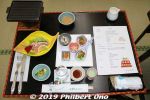
Appetizers for our full-course dinner.Mar 22, 2019
|
|
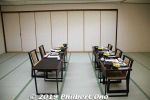
In the modern hotel tower, our banquet room for dinner.Mar 22, 2019
|
|

Typical room in the hotel's modern tower. Mar 22, 2019
|
|
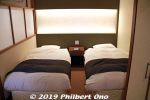
This is a typical room in the hotel's modern tower. Twin beds.Mar 22, 2019
|
|
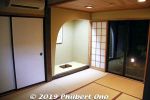
Taikan's residence is great for groups up to 22 people. It's a residence separate from the main hotel building so there's lots of privacy. Rates are very reasonable too. It was awesome to stay here.Mar 22, 2019
|
|
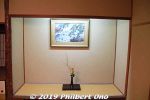
Beautiful tokonoma and painting.Mar 22, 2019
|
|
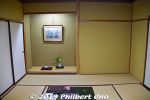
Another part of the Taikan house. Very aesthetic.Mar 22, 2019
|
|
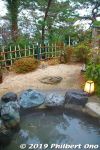
The Taikan house also has a small outdoor hot spring bath.Mar 22, 2019
|
|
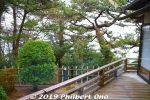
Outside the living room, a moon-viewing deck.Mar 22, 2019
|
|
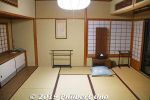
Another room of the living room.Mar 22, 2019
|
|
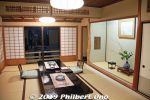
This used to be part of Yokoyama Taikan's living room, now one of the rooms where you can stay. Mar 22, 2019
|
|
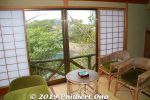
Mar 22, 2019
|
|
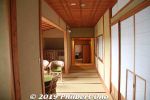
Main corridor inside Yokoyama Taikan Memorial Hall.Mar 22, 2019
|
|
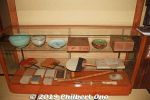
Yokoyama Taikan (1868–1958) is one of the most famous Nihonga painters. His former residence includes a showcase of his artifacts.Mar 22, 2019
|
|
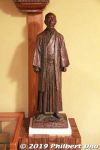
Statue of Yokoyama Taikan (横山大観), a very famous Japanese Nihonga painter. Taikan was born in Mito, the capital of Ibaraki. (横山大観)Mar 22, 2019
|
|
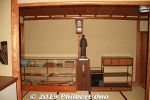
Entrance foyer of Yokoyama Taikan Memorial Hall where we stayed. Great private lodging for groups up to 22 people.Mar 22, 2019
|
|
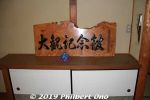
Itsuura Kanko Hotel is quite unique and historical because it renovated the artist residences of Nihonga painters Yokoyama Taikan and Kimura Buzan and uses them as part of the hotel where guests can stay. We actually stayed in the Yokoyama Taikan residence here. (横山大観記念館 特別室)Mar 22, 2019
|
|
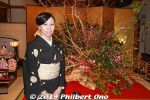
Itsuura Kanko Hotel's okami-san or proprietress (女将) speaks English. The hotel also has English-speaking staff.Mar 22, 2019
|
|
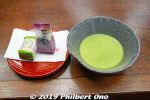
My complimentary matcha tea and confections.Mar 22, 2019
|
|
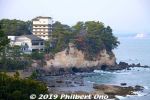
Near Rokkakudo Pavilion on the Izura coast is Itsuura Kanko Hotel (五浦観光ホテル), pictured here on the cliffs. This was our hotel for the night. It had prime views of the coast.The hotel was high enough on the cliff to escape the five-meter-high tsunami on March 11, 2011. The hotel suffered only minor damage from the earthquake. The ground is very solid here, so quake damage was minimal.
Note that the hotel's name is pronounced "Itsuura" while the coast is "Izura." (Kanji characters are the same.) izura.netMar 22, 2019
|
|
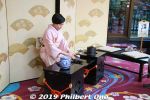
We arrived in the late afternoon in time for a tea ceremony in the hotel lobby. Conducted by the hotel's okami-san (proprietress 女将).Mar 22, 2019
|
|
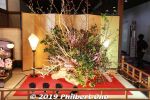
Lovely flowers in the hotel lobby.Mar 22, 2019
|
|
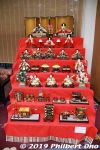
In the hotel lobby, Hina Matsuri dolls displayed for Girl's Day in early March.Mar 22, 2019
|
|

In the hotel lobby: Kita-Ibaraki's official mascots, An-chan and Kou-chan. Together, they are "Ankou" which means "monkfish," or angler fish that is the city's most famous delicacy. An-chan is a fisherman, and Kou-chan is a monkfish.Mar 22, 2019
|
|
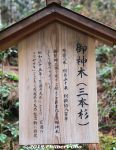
About the cedar tree.Mar 22, 2019
|
|

Rare cedar with three trunks.Mar 22, 2019
|
|

Rare cedar with three trunks.Mar 22, 2019
|
|

Walking to the famous cedar tree.Mar 22, 2019
|
|
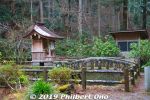
Benzaiten Shrine.Mar 22, 2019
|
|
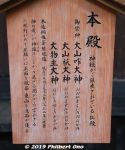
Gods worshipped by Hanazono Shrine includes Sanno, the mountain deity. Mar 22, 2019
|
|
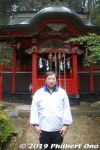
Hanazono Shrine priest.Mar 22, 2019
|
|
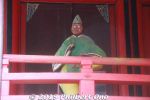
Mar 22, 2019
|
|
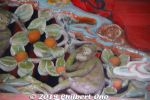
Covering only one eye.Mar 22, 2019
|
|
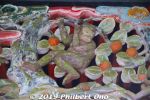
Covering only one ear.Mar 22, 2019
|
|
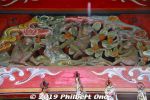
Hanazono Shrine also has a version of the three monkeys here on the Honden shrine hall, but only half the mouth, only one ear, and only one eye are covered as you can see here. Mar 22, 2019
|
|
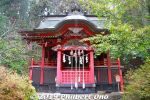
Kita-Ibaraki's Hanazono Shrine was patronized by the Tokugawa shoguns. It features the flamboyant architectural style called "gongen-zukuri" (権現造) with colorful, intricate wood carvings on shrine buildings. It's similar to the famous Toshogu Shrine in Nikko (Tochigi) dedicated to Ieyasu. Toshogu in Nikko is famous for the three monkeys: "see no evil, hear no evil, speak no evil." 本殿Mar 22, 2019
|
|
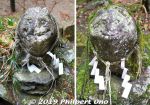
Koma-zaru guardian monkeys (instead of dogs). 狛猿Mar 22, 2019
|
|
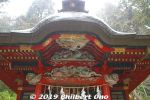
Haiden worship hall. 拝殿Mar 22, 2019
|
|
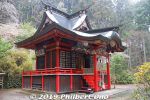
Haiden worship hall. 拝殿Mar 22, 2019
|
|

KaguradenMar 22, 2019
|
|
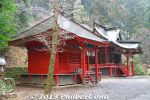
Mar 22, 2019
|
|
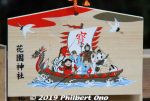
Ema prayer tabletMar 22, 2019
|
|
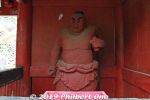
Romon GateMar 22, 2019
|
|
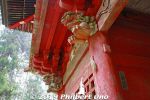
Romon GateMar 22, 2019
|
|
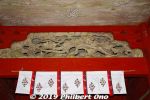
Romon GateMar 22, 2019
|
|

Romon GateMar 22, 2019
|
|
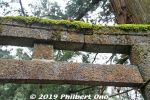
ToriiMar 22, 2019
|
|
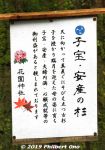
About the pregnant tree. This tree's male partner and due date are unknown.Mar 22, 2019
|
|
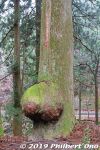
In Kita-Ibaraki, Hanazono Shrine's pregnant tree, now an object of worship for wannabe mothers and pregnant mothers for a safe childbirth. Near the first torii.Mar 22, 2019
|
|
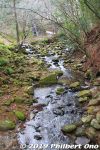
Hanazono Gorge, a major tourist spot in Kita-Ibaraki.Mar 22, 2019
|
|
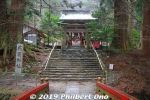
Hanazono Shrine (花園神社) is in the scenic Hanazono Gorge in the mountainous interior of the city. It's not related to Hanazono Shrine in Shinjuku, Tokyo, but it's related to Hie Shrine in Akasaka.It belongs to the same family of Shinto shrines worshipping the mountain deity Sanno (山王) headquartered at Hiyoshi Taisha Shrine at the foot of Mt. Hiei in Shiga Prefecture. Mar 22, 2019
|
|

An-chan and Kou-chan mascots in Aloha shirts.Mar 22, 2019
|
|
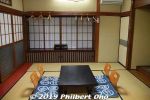
Standard size room in Minshuku Uohiko.Mar 22, 2019
|
|
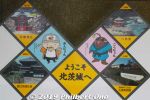
JR Isohara Station welcome sign.Mar 22, 2019
|
|
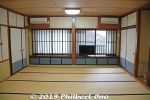
Large room in Minshuku Uohiko.Mar 22, 2019
|
|
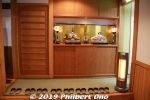
Minshuku Uohiko uses natural hot spring for the bath.Mar 22, 2019
|
|
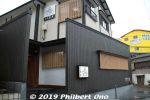
Onsen Minshuku Uohiko lodge near Hirakata Port. Ankou-nabe is a specialty. Recently renovated. 温泉民宿 魚彦Mar 22, 2019
|
|
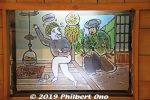
However, the 12 whalers were instead held captive by the local samurai. They were tied to plum trees or confined to caves. More British ships arrived seeking the release of the prisoners.Also, the Mito Clan also brought in neighboring clans like the Taira Clan as reinforcement for a potential battle. Cannons were pointed at each other, but a conflict was averted by giving the whalers the water and food that sent them along their way away from Japan. In return, the whalers gave guns, spears, felt, gold, and silver as payment and had to promise not to approach Japan again.Mar 22, 2019
|
|
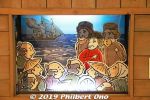
The crew suffered from scurvy due to the lack of vitamin C. They needed water and vegetables so 12 British whalers landed on Otsuhama beach in Kita-Ibaraki. They were willing to barter guns, spears, gold, etc., as payment. (大津浜事件) Mar 22, 2019
|
|
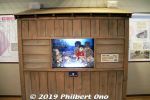
Yo-soro Museum also has this kami-shibai storytelling room. Story about British whalers who landed on Otsuhama beach in Kita-Ibaraki in May 1824 in search of food and water.It was during the time Japan largely prohibited contact with foreigners. By the 1800s, whaling ships from the West were frequently seen off the coast of Japan. In May 1824, multiple British whaling ships appeared off the coast of Kita-Ibaraki.Mar 22, 2019
|
|

The museum also has display panels showing the tsunami damage suffered by Kita-Ibaraki. Ibaraki Prefecture, being on the southern fringe of the Tohoku Region, suffered major earthquake and tsunami damage in March 2011.Kita-Ibaraki being closest to the Tohoku Region on the coast, suffered the most in Ibaraki Prefecture. The flat sandy beaches were overcome by the tsunami (second wave around 5 meters high) that caused much damage to Kita-Ibaraki. This is the Hirakata area after the tsunami. Besides major damage along the coast, the interior areas had numerous landslides, collapsed walls, and damaged roads due to the quake. Mar 22, 2019
|
|
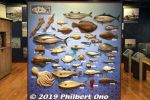
Display of all the fishes caught in Kita-Ibaraki.Mar 22, 2019
|
|

Ten people in Kita-Ibaraki died directly or indirectly due to the tsunami/earthquake and 186 injured. Over 8,000 homes in Kita-Ibaraki were damaged and up to 5,000 people had to evacuate to emergency shelters.These numbers pale in comparison to the three Tohoku prefectures, so Ibaraki doesn't get much attention with regard to 3-11, although the Emperor and Empress did visit Kita-Ibaraki in late April 2011.Mar 22, 2019
|
|

The boat, with shrine priests and musicians aboard, is rocked side to side as it is dragged on the street for several hours. This festival will be held on May 2nd–3rd, 2019. At least 160,000 spectators are expected to see it. Mar 22, 2019
|
|
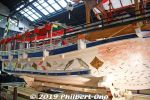
About 500 people drag this boat along a 1,200-meter route of paved streets. They lay wooden beams on the road for the boat to traverse on. Mar 22, 2019
|
|
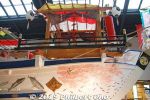
It's the city's grandest festival and very unique because this boat is pulled on city streets instead of sailing on the water. Mar 22, 2019
|
|
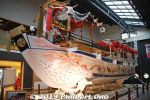
In Kita-Ibaraki, the Yo-soro Fishing History Museum's centerpiece exhibit is this wooden boat (祭事船) used in the Hitachi-Otsu Ofune Matsuri boat festival held every 5 years (常陸大津御船祭り). Mar 22, 2019
|
|
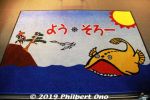
Welcome mat saying "Yo-soro" which means "Go ahead" for boat navigation.Mar 22, 2019
|
|
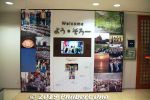
Yo-soro Fishing History Museum, 5 min. by taxi from JR Otsuko Station. Pretty large facility with local fishing-related exhibits. 北茨城市漁業歴史 資料館「よう・そろー」Mar 22, 2019
|
|

Akatsukien onsen minshuku dining room where we had monkfish hot pot. ¥14,000/night including dobujiru. 民宿 暁園Mar 22, 2019
|
|

This is monkfish hot pot (dobojiru ankou-nabe) どぶ汁 with monkfish parts in a miso broth. I didn't have any problem eating it. The flavor was certainly not objectionable, it's just another kind of fish.It was already prepared for us and it wasn't the fish we saw carved. Mar 22, 2019
|
|
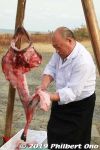
The white meat of monkfish.Mar 22, 2019
|
|
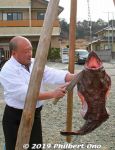
Monkfish being skinned and carved up by an expert chef. Since the monkfish is too slimy and slippery on a cutting board, it is hung like this for carving. It's a lot easier to cut up this way.He first takes off the skin (loaded with collagen).Mar 22, 2019
|
|
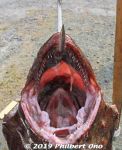
Look into the big mouth and see another set of teeth on the throat. All the teeth are pointed inward so its pray cannot escape. Like the aliens in the movie "Alien."Mar 22, 2019
|
|
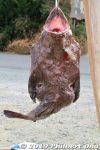
It's Kita-Ibaraki's famous fish and delicacy, monkfish, in the flesh. This one is 5 or 6 years old, weighing 12.7 kg. Only the female monkfish is eaten. The males are too small.あんこうMar 22, 2019
|
|
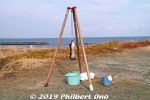
Oh look, something's hanging there...Mar 22, 2019
|
|
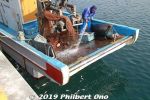
Cleaning up the fishing boat. Bycatch dumped overboard, but the birds are not picking it up.Mar 22, 2019
|
|
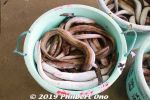
Sea eels or anago.Mar 22, 2019
|
|
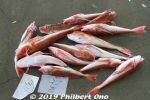
Mar 22, 2019
|
|
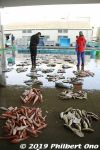
Mar 22, 2019
|
|
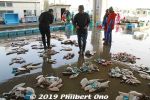
Each pile of fish is for a single bid.Mar 22, 2019
|
|
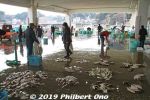
Besides monkfish, other fishes are sold at auction. This is not yet a tourist attraction since we were the only outsiders there.Mar 22, 2019
|
|

There are many species of angler fish in the world. The one caught in Japan is this one, Lophiomus setigerus.Monkfish has a big head, wide mouth, and a lure on the forehead to attract small fish. Looks kind of grotesque and lives on the ocean floor.Mar 22, 2019
|
|

Monkfish/goosefish (あんこう), a type of anglerfish. They are most prized for their liver (ankimo), a local delicacy.Mar 22, 2019
|
|
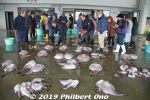
Hirakata Port's main catch is the monkfish/goosefish (あんこう), a type of anglerfish. Ibaraki Prefecture's coast is one of Japan's prime areas for monkfish. These are all monkfish being auctioned in the afternoon. 平潟港 せり見�Mar 22, 2019
|
|

It's unlike the old Tsukiji fish market or the new Toyosu Market in Tokyo.Mar 22, 2019
|
|

Hirakata Port has a fish market that holds a fish auction in the afternoon. This is a typical wholesale fish market in Japan. Open-air, flat roof with a concrete floor next to fishing boats. Mar 22, 2019
|
|
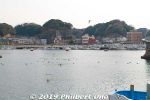
Hirakata Port is a major fishing port in Kita-Ibaraki.Mar 22, 2019
|
|
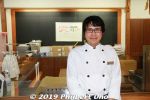
Our dorayaki teacher and Tengokoro store manager.Mar 22, 2019
|
|

The final step is to spread some azuki bean paste on one side and compress it into a sandwich. Way more delicious than any dorayaki you buy in a store.Mar 22, 2019
|
|
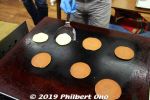
Dorayaki is like a small pancake sandwich with azuki bean paste in between. Wait until the batter bubbles and flip it over. Perfect each time. The dorayaki batter is very different from pancake batter.Mar 22, 2019
|
|
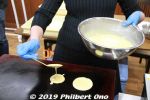
At Tengokoro, you can make your own dorayaki with azuki bean paste. The shallow ladle contains the perfect amount of batter to make one pancake. Mar 22, 2019
|
|
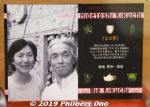
Kikuchi Hidetoshi and wife Mie.Mar 22, 2019
|
|
|
|